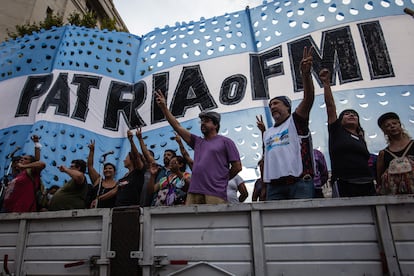‘I love you, I hate you’: Argentina’s toxic relationship with the IMF
Over the years, Argentina has been one of the countries that has signed the most agreements with the IMF… but it has also frequently failed to comply with the terms set by the financial agency and has reneged on several deals

“I love you, I hate you, give me more.” This is an iconic phrase from the Argentine rock songbook. It also nicely sums up the relationship that Argentina has maintained with the International Monetary Fund (IMF) for decades. A story that – as in any drama – includes disagreements, mistrust, deceit, hypocrisy and spite.
Many Argentines hold the IMF – a major financial agency of the United Nations, headquartered in Washington, D.C. – as responsible for many of the ills that the country has long suffered from. They accuse the international institution of promoting neoliberal “recipes,” forcing painful fiscal adjustments, causing poverty and unemployment, encouraging capital flight and much more. In short, many Argentines feel that the IMF is an essential cause (although not the only one) of national decline.
What’s interesting, however, is that no foreign government, international organization, or intergalactic conspiracy forced Argentina to request membership in the IMF back in 1956. Nor did anyone force the South American nation to ask for a single dollar or maintain its membership. However, what is a reality is that Argentina doesn’t have a sustainable system: no person, family, or nation can spend more than what they earn indefinitely. In the short or long-term, this means bankruptcy. But that’s what we Argentines have been trying to do for decades: we want to live beyond our means.
What’s the score?
Argentina is one of the countries that has signed the most agreements with the IMF in its entire history: 22. The first was completed in 1958, according to official records. Essentially, we ask the IMF for assistance (or we drop our pants for them, according to the institution’s critics) every three years, on average.
Argentina is also one of the countries that has most often failed to comply with the terms set by the financial agency, while frequently renegotiating the programs it has agreed to. Or, to put it another way: we sign, get the money… and then refuse to do what we promised to do. Or we totally ignore what was asked of us in exchange for the rescue package. Let us not forget that, in the 1990s, the IMF advised Argentina to abandon the convertibility law, which fixed the exchange rate at one Argentine peso per U.S. dollar… the same policy that we all now say was an unsustainable fantasy.
Argentina is one of the very few countries that has kept data hidden from the Fund. During the years of Kirchnerism – when Néstor and Cristina Kirchner governed uninterruptedly from 2003 until 2015 – numbers from the National Institute of Statistics were fudged. This resulted in the IMF imposing a “declaration of censure” on Argentina, which took years to lift.
Argentina is also one of the countries that has generated the most debate on the Fund’s board. Yet, contrary to what many believe, the United States has not always been the most critical of the country. Instead, successive American governments have had bigger disputes with members such as Germany, Italy, or Japan.
Despite all of the issues it has had with the financial agency, Argentina is one of the countries that asks the Fund for the biggest sums of money… and also owes it the most. This isn’t because the IMF is like a drug dealer that promotes the country’s “addiction” and then “squeezes” the consumer, who has by then become dependent. Rather, successive Argentine governments have traveled to Washington, knocked on the Fund’s door and asked (or begged) for a check.
Our requests, on top of that, sometimes border on the ridiculous. How does it appear to other capitals, when a sector of the Argentine government asks the IMF for money, while another part of the same government then demonizes the agency? As if the Fund doesn’t have access to the internet, or representatives in Buenos Aires…
But the double discourse doesn’t end there. There are many Argentine officials – who have served under different administrations – who have wanted to implement structural reforms or fiscal adjustments. But since these ideas were unpopular among the electorate, they blamed the IMF: “In Washington, they forced us to do this…”
Entering into agreements with the Fund has its advantages. It functions as a
lender of last resort, meaning that borrowing from the IMF is much cheaper than borrowing from private banks. The agency is also a careful auditor of good fiscal practices, while it provides transparent numbers for those who are considering investing in Argentina, or purchasing sovereign bonds from us.
Of course, dealing with the Fund also has its downsides. As a lender of last resort, you get to impose the conditions you want. After all, one goes to the lender of last resort because all the other lenders are no longer an option. And, on top of that, the IMF demands to audit a country’s accounts (the “Article IV reviews”) and publishes its conclusions… which is not always pleasant when the country is going downhill.
In this context, is it possible to take another path? Of course. But for that, Argentina would need to establish an exemplary economic and financial conduct, or have considerable and growing reserves. Or the government would need to stabilize the currency, so that it will be desirable on the international market.
It’s also possible to dispense with the Fund without these conditions being in place. But this can be more expensive, as when Argentina cancelled its debt with the Fund back in 2006 (despite the low interest rate) and replaced it with securities that it sold to Venezuela, at a rate that was several points higher.
Selling sovereign bonds also comes with big risk: investment bankers tend to be distrustful, as they evaluate (on a daily basis) the merits of buying or selling said bonds. This past April, a London court ordered Argentina to pay $704 million to four hedge funds. This was the difference between the interest that Buenos Aires paid on the debt accrued and the interest it should have actually paid, as the judge ruled that the Argentine government had deliberately understated GDP. Other similar lawsuits are moving through the legal process in New York. Finally, playing outside the Fund can leave a country outside the global financial circuit. Argentina would be an outcast if it departed.
All of the aforementioned points may seem like part of a defense of the IMF. They are not. Many of the agency’s practices have been questioned, including by Nobel Prize-winning economists. This is largely due to the double standards that the IMF applies to emerging powers and economies (as its officials are far from impartial) and because many of its diagnoses and prescriptions are wrong. Several books have been written about this, while excellent courses are taught to better analyze it, such as one offered by an Argentine – Héctor Torres – at the Di Tella University in Buenos Aires. He was a former IMF executive director
But it would also be good for Argentina to start by looking in the mirror. Our governments and officials should stop acting like teenagers. As a country, we should stop singing to the IMF, reciting the lyrics of Peperina, a song by the Argentine rock group Serú Girán: “I love you, I hate you, give me more.”
Sign up for our weekly newsletter to get more English-language news coverage from EL PAÍS USA Edition
Tu suscripción se está usando en otro dispositivo
¿Quieres añadir otro usuario a tu suscripción?
Si continúas leyendo en este dispositivo, no se podrá leer en el otro.
FlechaTu suscripción se está usando en otro dispositivo y solo puedes acceder a EL PAÍS desde un dispositivo a la vez.
Si quieres compartir tu cuenta, cambia tu suscripción a la modalidad Premium, así podrás añadir otro usuario. Cada uno accederá con su propia cuenta de email, lo que os permitirá personalizar vuestra experiencia en EL PAÍS.
¿Tienes una suscripción de empresa? Accede aquí para contratar más cuentas.
En el caso de no saber quién está usando tu cuenta, te recomendamos cambiar tu contraseña aquí.
Si decides continuar compartiendo tu cuenta, este mensaje se mostrará en tu dispositivo y en el de la otra persona que está usando tu cuenta de forma indefinida, afectando a tu experiencia de lectura. Puedes consultar aquí los términos y condiciones de la suscripción digital.









































